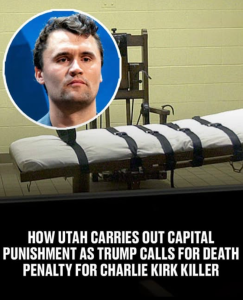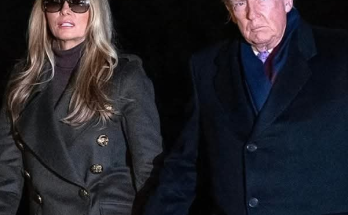Utah’s Death Penalty Under Spotlight After Arrest in Charlie Kirk Assassination
The assassination of conservative activist Charlie Kirk at Utah Valley University has sent shockwaves across the nation. But in Utah, the tragedy has done more than provoke grief—it has reignited a fierce debate over the state’s death penalty. With the arrest of 22-year-old Tyler Robinson, charged with capital murder, Utah’s justice system now faces a defining moment: Should the ultimate punishment be pursued, and what does it say about the values of a state still reckoning with political violence?
A Political Assassination and a Public Reckoning
Charlie Kirk was shot in the neck while hosting a campus debate event on September 10, 2025. The suspect, Tyler Robinson, allegedly fired a single round from a bolt-action rifle from a rooftop, then fled into nearby woods. The weapon was later recovered, along with bullet casings engraved with chilling messages like “Hey, fascist! Catch!”.
Governor Spencer Cox, visibly shaken, called it a “political assassination” and vowed that the suspect would be held accountable “to the furthest extent of the law”. That phrase—furthest extent—has become a flashpoint. In Utah, that could mean the death penalty.
Utah’s Death Penalty: A Controversial Legacy
Utah is one of 24 states that still allow capital punishment. It has a long and complex history with the practice, including the infamous use of firing squads. Though the last execution occurred in 2010, the law remains on the books, and prosecutors can seek death in cases involving aggravated murder.
The arrest of Robinson has placed that law under renewed scrutiny. Charged with capital murder, he could face death if convicted. Utah County Attorney Jeff Gray is expected to file formal charges on Tuesday.
For many, the question isn’t just legal—it’s moral. Should the state respond to political violence with the harshest punishment available? Or does that perpetuate a cycle of vengeance?
Governor Cox’s Balancing Act
Governor Cox, known for his “Disagree Better” initiative aimed at promoting civil discourse, now finds himself at the center of a storm. His response to Kirk’s killing was both compassionate and firm. He condemned the violence, urged unity, and reminded the public that Utah still has the death penalty.
“We mourn as a nation,” Cox said. “If anyone in the sound of my voice celebrated even a little bit at the news of this shooting, I would beg you to look in the mirror and to see if you can find a better angel in there somewhere”.
His words struck a chord. Cox’s call for accountability was clear, but so was his plea for reflection. He didn’t advocate for the death penalty outright, but he didn’t shy away from its possibility either.
A Divided Public
Utahns are deeply divided. Some see the death penalty as justice for a heinous crime. Others argue that it’s outdated, ineffective, and morally wrong.
Conservative voices, including President Donald Trump, have called for the death penalty in this case. “I hope he gets the death penalty,” Trump said in a Fox News interview. “Charlie Kirk was the finest person. He didn’t deserve this”.
Progressive groups, meanwhile, have urged restraint. The Utah chapter of the ACLU released a statement saying, “While the pain of this tragedy is immense, we must not let grief drive us toward irreversible punishment. The death penalty is not justice—it is retribution.”
The Legal Path Ahead
For prosecutors, the decision to seek the death penalty involves multiple factors: the severity of the crime, the evidence, the wishes of the victim’s family, and public interest. In this case, the evidence is chilling. Engraved bullets, chat messages, and a confession to family members paint a picture of premeditated political violence.
Robinson’s arrest was made possible by his own father, who recognized him from FBI photos and urged him to turn himself in. The suspect reportedly refused at first, but later relented with help from a youth pastor connected to U.S. Marshals.
If convicted, Robinson could face life in prison or death. The choice will rest with prosecutors—and ultimately, a jury.
Erika Kirk’s Voice
Charlie Kirk’s widow, Erika, has emerged as a powerful voice in the aftermath. In her first public remarks, she vowed, “I will never let your legacy die”. Her grief is raw, but her resolve is clear. She has not publicly commented on the death penalty, but her influence could shape the conversation.
Turning Point USA, the organization Kirk founded, has pledged to continue its work. Erika Kirk will lead the upcoming AmericaFest conference, and the fall campus tour will proceed as planned. “The movement my husband built will not die,” she declared.
A Moment of National Reflection
The Kirk assassination is not an isolated incident. It joins a growing list of politically motivated attacks—from the shooting of Paul Pelosi to assassination attempts against President Trump. The question now is how America responds.
Governor Cox asked, “Is this what 250 years has brought on us?”. His words echo across party lines. The death penalty debate is not just about one man—it’s about the kind of justice we believe in, and the kind of society we want to build.
Conclusion: Justice or Vengeance?
As Utah prepares for Robinson’s arraignment, the state stands at a crossroads. The death penalty is legal, but is it right? Charlie Kirk’s murder was brutal, calculated, and politically charged. But justice must be more than punishment—it must be principled.



